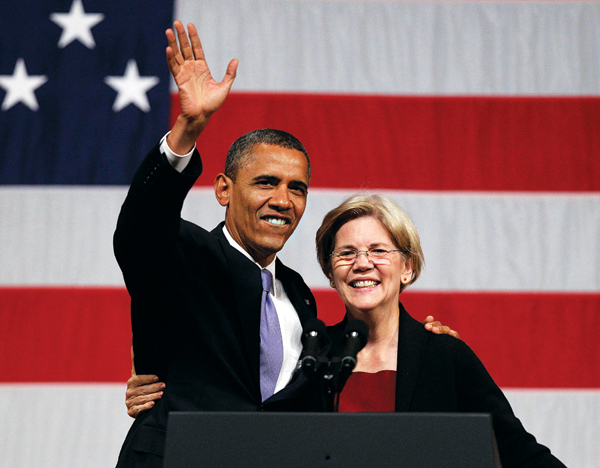Elizabeth Warren: Stumped

Warren introduces President Obama at a Symphony Hall fundraiser this summer. (Photo by Stephan Savoia/AP Images)
For the better part of 20 years, Joyce Linehan’s innocuous blue cottage in Dorchester has played host to indie-rock icons like the Smashing Pumpkins, Courtney Love, and the Flaming Lips when their tours have brought them through town. “My house was a place where a lot of semi-well-known musicians have stayed,” says Linehan, an arts publicist. “But I didn’t get starstruck until Elizabeth Warren walked through my front door.”
In August 2011, Linehan, who is also a Democratic activist, gathered 70 people in her living room for what was essentially a coming-out party for Elizabeth Warren’s political career. Warren, a consumer finance expert, had spent decades advocating on behalf of the American middle class, and had become known for her ability to take tedious, dry aspects of bankruptcy law and make them seem simple. Her bestselling book, The Two-Income Trap, led to regular appearances on the Dr. Phil talk show. In 2008 she was recruited to Washington to chair the Congressional Oversight Panel for the bank bailout, where she was the watchdog overseeing the disbursement of the $700 billion Troubled Asset Relief Program (TARP), then orchestrated the creation of the Consumer Financial Protection Bureau, a federal agency established to “promote fairness and transparency for mortgages, credit cards, and other consumer financial products and services.” In the two and a half years she spent in Washington, her push for stronger consumer-protection laws to benefit working families made her the darling of the left. “I want to make out with you,” Jon Stewart told Warren when she appeared on The Daily Show in January 2010.
The evening of the get-together at her house, Linehan says, she and her circle “were begging” Warren to get in the race. “We knew the kind of scrutiny she’d be under and how difficult it could potentially be for her and her family,” Linehan says. “We genuinely liked the woman…. We were strangers to her, but she wasn’t a stranger to us.”
Warren announced her candidacy last September, and within weeks her ability to electrify her supporters was on full display. A video from an informal talk she gave in Andover lit up YouTube. In the clip, Warren argues that the owners of successful private businesses were aided on their path to wealth by public investments in things like education and infrastructure. “There is nobody in this country who got rich on his own. Nobody,” she says. It wasn’t long before other Massachusetts Democrats dropped out of the race and Warren’s path to her party’s nomination was essentially cleared. In October her campaign announced that it had raised $3.15 million. The Brown-Warren contest made national headlines as the year’s most important non-presidential race.
To her supporters, Warren is the Sheriff of ?Wall Street. Her blunt attacks on the financial sector—she joked that she’d either see the CFPB created or leave “plenty of blood and teeth on the floor”—for its bending and breaking of rules captured the imagination of frustrated liberals who felt the current administration had failed to live up to its promise of hope and change.
To her critics, Warren is a menace, out to gut the financial industry and, with it, capitalism itself. While in Washington, she was portrayed by her Republican detractors as incompetent and boastful. “I think anybody who has had any experience in Washington was quite startled with the way she took that relatively obscure [TARP] position and turned it into a platform to promote herself,” says Todd Zywicki, a law professor at George Mason University. For his part, Republican Congressman Patrick McHenry of North Carolina went so far as to call Warren a liar during a Congressional hearing.
In her rise to national prominence, then, Warren has taken her place alongside other Democratic bogeymen like George Soros, the Kennedys, and Nancy Pelosi. And that was before she stated that she was the “intellectual foundation” for Occupy Wall Street.
To nearly everyone who knows her name, Elizabeth Warren has become a symbol. But in the months since she announced her intention to unseat Scott Brown, Elizabeth Warren has become something else: a candidate. And that is proving to be the challenge.